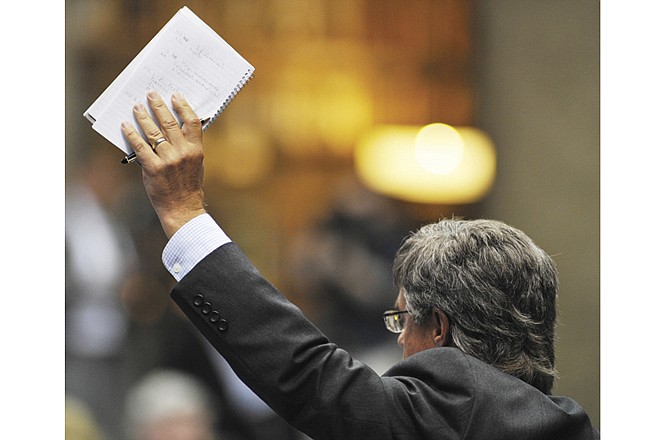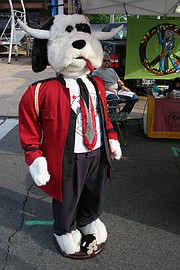Missouri lawmakers' rejection of more than a half-dozen of Gov. Jay Nixon's vetoes set a new record for successful overrides.
But three of the big-ticket bills didn't make it to that list.
The House failed to override Nixon's veto of a controversial tax cuts bill, and the Senate fell one vote short of passing the "Second Amendment Preservation Act" over the governor's objections. The sex offender registry bill was withdrawn by its sponsor shortly after it was called in the House.
Lawmakers were expected to finish their veto session work in one, long day rather than taking two or three days as had been predicted earlier. At press time, the House was reviewing Senate bills.
Even before the veto session officially began Wednesday, the Capitol grounds were a flurry of activity.
Gun rights advocates gathered on the South Lawn for a late-morning rally supporting lawmakers' efforts to override Nixon's veto of the gun rights bill.
Opponents said it would nullify certain federal gun policies and make it illegal for federal authorities to enforce the laws, or to work with local and state law officers.
But the supporters argued the measure re-enforced Missourians' rights to keep and bear arms, already granted by the U.S. Constitution's Second Amendment but threatened by the federal government and others who seek to regulate those rights.
Once the session began at noon, the Senate worked much more quickly than the House.
Combined, the two chambers had 29 vetoed bills up for possible override.
Each chamber debated most of the bills but passed over others.
Debates are allowed so that lawmakers themselves have a chance to argue for, and against, efforts to reject the governor's rejections.
The Missouri Constitution requires a two-thirds vote of the total seats in each chamber to override a governor's veto: 109 in the House, 23 in the Senate.
A bill must be overridden by both chambers to become law.
At the top of many lawmakers' agenda this year were:
House Bill 253
The House failed to override the 177-page bill that proposed, among other things, to cut income taxes on personal incomes and businesses, and to increase taxes on textbooks and prescription drugs.
The vote was 94-67 - 15 votes short of the 109 needed for an override.
The Senate never had a chance to debate it.
Supporters of the bill said it promoted business growth in the state, as well as increased job opportunity.
But those opposed, including Nixon, worried it would cut key funding for education and social services.
House Bill 301
Rep. Kevin Engler, R-Farmington, withdrew his motion for the override of the bill which would have modified sex offender laws, including allowing some on the Offender Registry to be removed for crimes they committed as teenagers.
He said many lawmakers aren't comfortable with the language of the bill, so it would be beneficial to work on modifying it, and bring it back in 2014.
House Bill 436
The House voted 109-49, with three abstentions, to override Gov. Jay Nixon's veto of the gun rights measure, but the Senate defeated the override, by a 22-12 margin - one short of the 23 votes needed.
Supporters said it defended Missourians' rights to keep and bear arms.
Opponents said the bill would nullify the enforcement of federal gun laws in the state, a violation of the U.S. Constitution's Supremacy Clause.
Near the end of the day, House Speaker Tim Jones urged the governor to call legislators into a special session to address the issues Nixon had within his vetoed bills.
"The legislature is ready and willing to work with Gov. Nixon to ensure these new laws have no unintended consequences or negative repercussions," said Jones, R-Eureka. "If he truly believes these pieces of legislation are flawed, we can immediately be called into a special session where we can quickly and efficiently fix any problems that may exist with a minimal cost to taxpayers."
Nixon last week rejected a similar call for a special session on the tax cuts bill, saying lawmakers would have plenty of time in the 2014 session to address those issues.
He said in a press conference Wednesday evening that he's open to tax reform, as long as it is directly tied to job creation and is affordable.
"I've not closed my eyes or my mind to sitting down and having a thoughtful discussion about it," he said.
Zach Matson contributed to this report.
Related articles about Wednesday's veto session:
House fails to override tax-cut bill
Nixon "gun rights' veto sustained
Veto sustained on Missouri unemployment bill
Veto sustained on Missouri international law bill
Gov. Nixon's veto sustained on UN agreement
Veto stands on Missouri work comp database
Additional online resources:


